2022 Orientation: Family Wellness
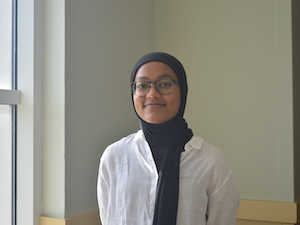 Fatima Elzamzami | Franciscan Center
Fatima Elzamzami | Franciscan Center
Throughout orientation, we were asked to reflect on the various activities and presentations that we went through/watched. For me, I think this was the most challenging part; putting into words how a certain experience made me feel. This week, I realized how little self-reflection I had actually done in the past year. Although I was involved in various activities that dealt with social issues, I definitely did not take enough time to reflect on how these experiences impacted me, as well as take time to look at these experiences through different lenses (eg. how my privilege impacts my work, how my identity fits into my work, etc.). The small group reflections really helped me realize the importance of reflection. Not only did I learn more about my fellow interns’ experiences, but also learned a lot more about myself. Having a passing thought versus putting those thoughts into sentences really makes a difference in how much meaning I was able to take away from an experience and how much understanding I gained. Because of this, I am really glad that reflection is so deeply integrated into the CIIP experience. I think it will really force me to be honest with myself (even if it makes me uncomfortable) and process and understand everything I go through on a deeper level. I definitely plan to incorporate more self-reflection into everything that I do in the future.
In the same breath, the part of orientation that I enjoyed the most was my conversations with other people. I think my favorite conversation I had was with one of the randomized groups I was in, where we all came to the realization that all of our placements were in the White L. We discussed what implications this might have for the people that our placements are designed to serve. For example, people in the Black Butterfly might not be able to access our placements/resources in general because of transportation barriers. We then talked about the reasons why our placements are located in the white L (e.g., funding, staff, etc.). I like how tied in a lot of what we learned from the presentations that we listened to and were able to apply what we learned to the work that we will be doing. I am excited to have similar conversations in the future!
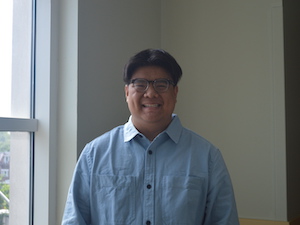 Kobi Khong | Rebuild, Overcome, and Rise (ROAR) Center
Kobi Khong | Rebuild, Overcome, and Rise (ROAR) Center
This week for me was a lot of firsts in a while and a lot of it was as terrifying as it was intensely interesting. Our CIIP orientation was my first step back into a large group environment ever since that little pandemic threw the world upside down. In a world of zoom interactions and zoom relationships there’s a lot less commitment in the way we learn from each other. Taking breaks is an important part to ensuring that you’re functioning in the work that you do and practice self-care, but I know that during these past years I had been using the ability to zone out and turn off my camera and mute myself as a crutch. I didn’t push myself out of my comfort zone because I didn’t have to always be “on” which also meant that I stopped myself from being fully invested in the things that I do.
Throughout my life I’ve always been a pretty passive person (alliteration!), but both in terms of relationships with my peers in the program and with my role as a student and intern who lives in Baltimore, a common theme we learned in orientation is the need to move forward and take active stances.
In our formal group reflections and our more creative moments of bonding through theater reflections, it was nerve-wracking. Even answering questions about/for myself in our self-reflection periods was difficult because I wasn’t accustomed to diving deep and asking myself questions I may have been uncomfortable with. I couldn’t just expect people to tell me things or connect with me on a surface level without me also matching their initiative and passion.
Listening to the speakers, we learned about the history of Baltimore and all the things that have contributed to the modern day city that we know. When we enter our internships we cannot do so solely as spectators or tourists that only work in a single dimension. It is not enough to only not be racist, we must take the initiative to actively be anti-racist. We do our work with context of the culture and history surrounding us and we must actively face these components that have contributed to the discrimination and inequity that exists in Baltimore today that creates the need for the non-profits that we all will be interning with this summer.
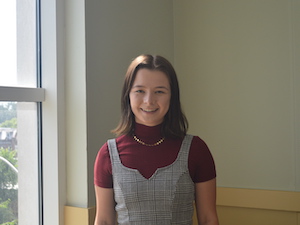 Maddy Kye | Episcopal Refugee & Immigrant Center Alliance
Maddy Kye | Episcopal Refugee & Immigrant Center Alliance
My orientation experience was intellectually and socially stimulating, to say the least. In spite of having spent several semesters in Baltimore, orientation made me aware of just how limited my knowledge of the city was, and, in many ways, continues to be. Furthermore, orientation offered me the chance to connect meaningfully with my peers: I came into orientation recognizing many of their names from classes and extracurriculars, but by the end of the week, I was simultaneously surprised and grateful for the bonds I had formed with them.
I realized I knew less about Baltimore than I had previously thought for two main reasons: first, the informative and educational presentations, and second, Wednesday’s scavenger hunt. While I knew the basics of the complicated relationship between Hopkins and Baltimore, as well as a bit about the disparities in income, education, and other areas across the city, CIIP Orientation challenged me to both engage more with this content and to reflect on what it means in relation to my summer internship. Additionally, the scavenger hunt sparked the realization that, although I have “popped” the Hopkins bubble in the past, there remain many areas that I am unfamiliar with. Obviously, one day of exploring Baltimore with my Peer Mentor group did not change the fact that my knowledge is limited, but it did introduce me to new areas and encourage me to continue doing so throughout the summer.
Finally, to touch more on the social aspect of orientation, I was challenged by the vulnerability and honesty expected by many of the activities, but more importantly, I appreciated the way I was able to engage with others in doing so. Many of the conversations that orientation prompted were difficult, but as a whole, they encouraged me to think deeply about what it means to serve Baltimore and resulted in me feeling closer with my peers in doing so.
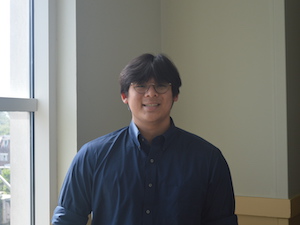 Jonathan Lee | Court Appointed Special Advocates (CASA) for Children of Baltimore
Jonathan Lee | Court Appointed Special Advocates (CASA) for Children of Baltimore
Coming into CIIP, I believed that my time volunteering and taking public health classes at Hopkins provided a strong foundation for many of the systemic and racial inequalities that exist in Baltimore. Just a couple hours into orientation; however, I quickly learned that a lot of my beliefs were flawed, deglamorized, and unrepresentative of the city. The various lecturers, nonprofits, community members, and CIIP alums who took time to speak on their experiences and love for Baltimore meant a lot. It was drastically different from any lecture I’ve been taught while at Hopkins. They knew the city through their time working directly in Baltimore, and they weren’t afraid to call out the many injustices that institutions like Hopkins have caused. My favorite talks were from Jessa from Station North Tool Library and Awoe. As CIIP alumni, it is clear that their careers were inspired by the non-profit work they pursued. Their love for Baltimore and desire to address urban inequality motivates me to embrace everything I’ll do this summer. I actually had the opportunity to listen to Awoe give a similar talk during my freshman year. He presented before one of our community events for the Alternative Spring Break to St. Louis. It was really cool to see everything come full circle through my time with the CSC.
In addition to the lessons I’ve learned throughout orientation, I’ve really enjoyed meeting everyone in CIIP and reflecting in my peer mentor group. My group, Home and Garden Television Presents the Koye Moving Co. (HGTVPTKMC), has been one of my favorite aspects of orientation. Koye has been able to foster immaculate vibes, and we’ve been able to have insightful conversations and learn from each other’s experiences. The scavenger hunt, in particular, really allowed us to work together to learn about Baltimore’s history, neighborhoods, and methods of transportation. I was able to explore the area close to my placement, eat extremely fresh watermelon, and meet a four year old kid named Kevin while swinging in the park. The ability to go into the neighborhoods that I’ve learned about in classes was very impactful. It puts a face to the name and highlights the unique history and demographic that each community has in Baltimore.
In my first week with CASA Baltimore, I’m very excited to learn more about foster care. This is an area that I don’t currently know much about, so I’m excited to embrace every day as it comes!
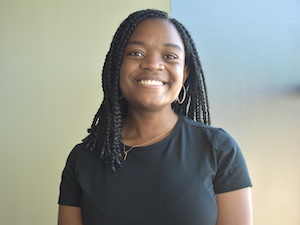 Koye Oputa | BCPS Special Education
Koye Oputa | BCPS Special Education
It’s easy to live like the exception, to unthinkingly live like some rule or principle does not apply to me. My mind does not run on delusions of grandeur nor any particular spectacularity, but it can be rather adept at escaping confrontation—and it does so with great irony.
For the past few years, I’ve placed myself in spaces that require constant confrontation of self, of community, and of society. Those spaces, one of them being CIIP, enable me to walk with purposeful direction as they offer me with a variety of new, thought-provoking words on a near-daily basis, such as the following:
“You can’t connect the dots without looking forward. You can only connect them looking backwards. So you have to trust that the dots will somehow connect in your future.” —Steve Jobs
“Everyone makes mistakes. Be oriented towards solutions not blame.”*
“The community you seek to serve is the expert in their own experience, not you.”*
Alongside all the new, lovely words I hear every day are the old ones. The ones I thought I had internalized, the ones that had become comfortable, were also the ones that suddenly opened my eyes to see that the issue is me.
This week, those words were “What challenged you most?” It was a question posed after almost every workshop hosted by the Theater Action Group (TAG) during CIIP orientation, including after an exercise wherein TAG had the whole CIIP cohort undergo a series of exercises to help us better understand others and ourselves.
I was most challenged by TAG’s request for everyone to organize themselves into groups, without using any words, according to one word: skin.A few of my peers tried to seek out fellow peers with tattoos and freckles, but we eventually defaulted into grouping by skin color. The Black people gathered together in one part of the room, then a group of our South Asian peers joined us. I was quick to make quiet, mental accusations of audacity as I wondered how they felt so bold as to join our group with such confidence. However, as I watched a light-skinned Southeast Asian person struggling to find their place in the room, then sheepishly decide to join the group of black and brown people, my haughty attitude was replaced with a mix of shame and a desire to be more welcoming.
I had realized (1) everyone in our group entered rightfully. I had conflated race with skin tone and while my South Asian peers weren’t black, their skin was brown as mine. (2) I had assumed far too much of my peers’ intentions—they entered the group as they saw similarities between us, not because they were disregarding or disrespecting our differences, and (3) it was unsympathetic attitudes like mine that foster a lack of understanding in communities, and leave people to struggle in the outskirts simply because they weren’t exactly the same as everyone else.
When TAG asked what challenged me most, it was not simply societal constructs or pressures, but it was my tendency to focus on differences and assume the worst of others. It’s a common tendency—a bias, really—that I have always taken note of in many social groups, but never took note of within myself. I never consciously thought myself to be innocent of such a bias, it wasn’t until that TAG workshop that I paused to consider whether I might be guilty.
I write this blog post with gratitude to the wise and vulnerable people in CIIP who remind me daily that we all need community and self-confrontation to grow, and to this, I am no exception.
*Quote provided by CIIP speakers, whose names I cannot remember.
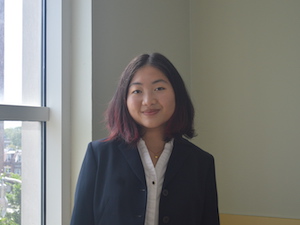 Estelle Yeung – Baltimore Harm Reduction Coalition
Estelle Yeung – Baltimore Harm Reduction Coalition
This week was not at all what I expected coming into CIIP, but I’m glad that the orientation activities had me challenging my biases and learning to become a more active listener. My cohort group and I had a great time exploring different areas of Baltimore during the scavenger hunt, and I’m glad that we’ve been able to get to know each other well. During reflection sessions with my peers, I was reminded of how difficult it is to be vulnerable and to share my experiences with others that I may not know well, which I will keep in mind going into my internship at BHRC. I’m also looking forward to pushing outside of my comfort zone this summer and exploring outside the “Hopkins bubble” to get to know the city more. Becoming more conscious of the various privileges I hold, examining what that means for my role at BHRC, and analyzing the complex relationship between Baltimore and Hopkins have also been significant aspects of my orientation experience. Other key themes of orientation for me include learning to take up space, making space for others, and active listening. Orientation has challenged me to reflect on how I can best step into my role at BHRC this summer and how I can make the most out of my experience while being a responsible, civically-minded intern, and I can’t wait for it to begin!
